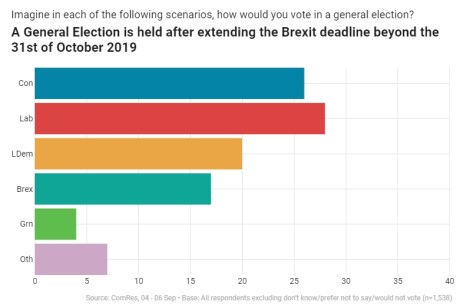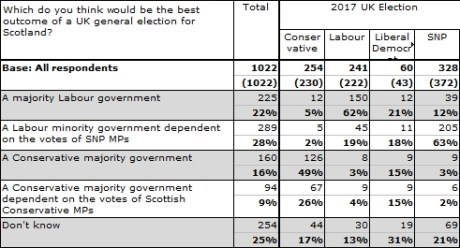As the mandate for a second independence referendum currently sits gathering dust in the SNP vaults, discussion has started on ways to generate some movement. One of these has been the possibility of a Wings political party being set up to campaign for Holyrood list seats, which has generated rather a lot of attention.

Various pundits have been loudly vocal about the perceived pros and cons, but I’ve been extremely dissatisfied – in particular with those dismissing the value of a Wings party – with the quality of evidence and analysis that they’ve produced to justify their negative opinion. So I thought I’d use my day-job skills in commercial data science to analyse and understand the benefits, or otherwise, of the idea.
Read the rest of this entry →
Tags: Gavin Barrie
Category
analysis, debunks, psephology, scottish politics
Supporters of the opposition’s plan to block a no-deal Brexit have been proclaiming vindication this weekend over a couple of polls which show significantly lower support for the Tories, and a lead for Labour, in the event that a general election is called after 31 October with Brexit not having happened.

In that scenario, Tory voters tell pollsters that they’re more likely to defect to the Brexit Party, and the resulting split in the Brexit vote appears to point towards a Labour-led government if you plug the figures into a site like Electoral Calculus.
The reality is much more complicated than that. But what we’re specifically interested in is how it would affect the chances of securing a second indyref, so let’s take a look.
Read the rest of this entry →
Category
analysis, psephology, scottish politics, uk politics
We’ve talked about this subject before, but a couple of findings in a new poll today by Survation really caught our eye.


And that tells us something quite profound about the UK’s voters.
Read the rest of this entry →
Category
comment, europe, psephology, uk politics
This poll from Opinium came out a few days ago, but didn’t get as much attention as people might normally have expected, possibly because it was presented in a very difficult-to-follow graphical form. So we’ve sorted it out, and also added in the missing Lib Dem voters.

The takeaway is that a clear majority of voters both in Scotland and the UK now believe that the UK government should accept the Scottish Government’s request for a second independence referendum.
Read the rest of this entry →
Category
analysis, comment, psephology, scottish politics, uk politics
We were having an idle browse on Google Play Books this morning for some bargain holiday reading when we happened upon a startling new cover for Chris Mullin’s 1982 classic A Very British Coup.

We found ourselves thinking “rise to what, exactly?”
And as it happened, we had some new Panelbase polling data on that.
Read the rest of this entry →
Tags: poll
Category
psephology, scottish politics, uk politics
Considering we’re only eleven days from a general election, there’s remarkably little politics coverage in the Sunday papers today. Most of what there is is in the Sunday Herald, which has a substantial (and quite entertaining) interview with Kezia Dugdale and another two pages devoted to what’s essentially spluttering attempted justification of its shambolic front-page lead from last week.

We’re not going to go into it in depth, as James Kelly on Scot Goes Pop! has already had a close look and made a pretty fair assessment. But for want of anything more interesting to talk about, and in the wake of some depressing Twitter conversations with people who apparently STILL don’t understand either the Holyrood electoral system or basic arithmetic, we’re going to have one more wade in the list-vote debate.
You might want to see if there’s football on or something.
Read the rest of this entry →
Category
analysis, debunks, psephology, scottish politics, stats
Last weekend’s edition of the Sunday Times gave an article to a Green activist and party worker – not billed as such, even though until last month he was on the party’s regional candidate list for Lothian – to predict that the Greens would get 10 seats at next month’s election.
Much campaigning by the various fringe parties for the Holyrood contest has been based on “seat predictors” like the one deployed to produce the figures in the piece, purporting to show that a tactical-voting strategy on the list can deliver a large gain in numbers of pro-independence MSPs compared to using both votes for the SNP.

We’ve examined that argument in considerable depth already, both theoretical and practical. But its also worth noting that so-called “seat predictors” are a rather shaky basis for making such bold forecasts.
Let’s illustrate that assertion.
Read the rest of this entry →
Tags: misinformation
Category
analysis, debunks, investigation, psephology, scottish politics, stats
With little in the way of news to chew on, the Scottish political blogosphere has begun to eat itself of late, with an exhausting number of articles on popular sites about how an SNP list vote is a wasted vote and anyone thinking of voting for the Nats in both constituency and region is a deluded cultist/simple-witted idiot (mostly written by candidates/supporters of other parties who are often not identified as such), and now some angry pieces from disgruntled SNP supporters making the opposite point.

All are based, from one perspective or another, on opinion polls and seat predictions based on those polls, some of which appear to be based on very shaky premises.
We’ve already broken down the mechanics of the Scottish electoral system at very considerable length, so readers will be relieved that we’re not going to get into that again. Instead, we thought we’d take a very specific region-by-region look at the scale of the task facing the fringe parties.
Read the rest of this entry →
Category
analysis, psephology, scottish politics
Stat-pummelled readers will be glad to know that this is the last article we plan to write about the vagaries of the AMS electoral system, and how it might apply to next year’s Scottish Parliament election, for some time. This one also shouldn’t be full of tables and figures, so strap yourself in and let’s get this job finished.

Read the rest of this entry →
Category
analysis, debunks, psephology, reference, scottish politics
We’ve only ourselves to blame, we’d be the first to admit. When we titled yesterday’s piece “AMS for lazy people” it was pretty much an invitation for people to get us to do their research for them, and so it proved.
Even as we slumped exhausted over a red-hot calculator, several readers wasted no time demanding a breakdown of how the mechanisms of the electoral system had affected last year’s European elections, in which UKIP defied some expectations (and delighted the Unionist parties and media) by taking a seat in Scotland.

So we suppose we might as well.
Read the rest of this entry →
Category
analysis, debunks, psephology, reference, scottish politics
The email we’ve had more than any other since the 8th of May is this one:
“Please can you explain how the Scottish election system works, and whether it’s a good idea for me as an SNP voter to give my list vote to someone else so as to ensure the maximum number of pro-Yes MSPs in Holyrood?”
We’d planned to leave that question until much nearer the relevant time, but to be honest we’re getting fed up of reading them, so let’s see if we can sort it out now.
Read the rest of this entry →
Category
analysis, debunks, psephology, reference, scottish politics






























